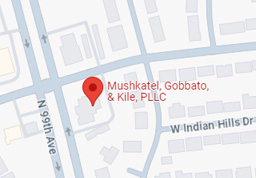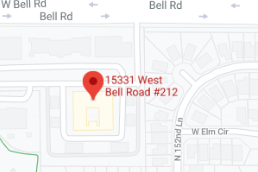Arizona Child Custody Process

If you and your ex share children and plan to divorce, you must determine how to split custody. Arizona’s child custody laws govern parents’ rights to legal custody, physical custody, and parenting time. An experienced Arizona child custody lawyer can walk you through the custody process and advocate for your and your child’s rights and interests.
Table of Contents
Determine Eligibility for Child Custody
First, you must determine your eligibility for physical and legal custody of your child. To petition for custody, a person must have biological or legal parentage over a child. Someone without biological or legal parentage, such as a stepparent, may face challenges in obtaining custody rights if they never legally adopted their stepchild.
File the Paperwork
The custody process begins when you petition the Arizona courts for a custody order or to establish paternity. Married parents who seek divorce or legal separation may include a claim for child custody in the complaint or answer. Forms for custody can typically be found on a family court’s website, such as the Maricopa County Superior Court family court forms.
Serve the Other Party
Once you’ve filed the appropriate paperwork with the family court, you must serve your child’s other parent. Serving papers involves sending a copy of the paperwork you filed with the court and the summons issued by the family court. You can hire a sheriff or process server to deliver the paperwork in person, or you can mail the paperwork.
If you choose to mail the paperwork, you should do so via certified mail with a return receipt requested and restricted delivery, which requires the Postal Service letter carrier to leave the mailing with your co-parent and not someone else who may reside with your co-parent.
Take a Parenting Class
The Arizona government created the Domestic Relations Education on Children’s Issues Program, also called the parent education or information program, to educate parents about the effects of divorce on children, the restructuring of families through the custody process, and judicial involvement. The Arizona Supreme Court establishes minimum standards for county programs, including the topics programs must cover and minimum qualifications for program presenters.
Parents with a child under 18 must take a parent education program when getting divorced or separated, when involved in a paternity/maternity case, or when presenting a child custody, parenting time, or legal decision-making dispute to the court. Parents who fail to complete the class may have their requests in a child custody matter denied by the trial court, or the trial court may hold the parent in contempt or impose other penalties.

File a Consent Decree
You and your ex may agree on all the terms of child custody, including who receives custody, which parent will serve as the parent of primary residence, and the parenting time schedule. In that case, you and your ex can submit a consent decree to the family court no earlier than 60 days after the filing of the petition or complaint.
The family court judge may sign your consent decree and adopt it as the court’s order. However, the court has discretion to order a hearing to consider the proposed consent decree. The judge may order a hearing if they have concerns about whether your and your ex’s proposed custody arrangement serves your child’s best interests.
Wait on the Response
However, if you and your ex have contested custody issues, you must wait for your ex to file an answer or response to the petition. If your ex lives in Arizona, they typically have 20 days to file an answer (25 days if you served them via mail). If they live outside the state, they have 30 days to file (35 if you served them via mail). These deadlines exclude the day you served your ex and any weekends and holidays. If the last day falls on a weekend or holiday, your ex has until the end of the next business day to file an answer.
Possible Mediation
Most family courts require or encourage parents to participate in mediation or resolution management conferences, where the judge or a mediator meets with the parties to discuss the disputed issues and potential solutions for a settlement or resolution. Alternatively, parents can hire a private mediator for mediation. Private mediators might have in-depth experience with a family’s unique issues, such as complex finances, children with special needs, or same-sex couples.
Go to Court
When parents cannot resolve all outstanding custody issues through a settlement or consent decree, the court will hold a hearing or trial. Both parents can present evidence and witnesses at trial and cross-examine each other’s witnesses. The family court judge will consider the parties’ evidence and arguments, along with any independent expert reports. The judge will ultimately issue a final order establishing the custody arrangement and parenting time schedule.
Follow the Judge’s Decision
You and your ex must follow the custody order issued by the family court, even if the judge altered the provisions of the consent order you and your ex agreed to. If you violate the provisions of the custody order, your ex can file a motion to hold you in contempt of the court’s order. This may result in the family court imposing monetary fines or other sanctions.
Seek Modification If Needed
As your family’s circumstances and needs change, your existing custody order may no longer serve your children’s best interests. You and your ex can petition the court to modify your custody order. A successful petition will require a parent to prove changed circumstances since the entry of the current custody order and show that a proposed amended order serves the child’s best interests.
Contact an Arizona Child Custody Lawyer
If you face disputes with your ex over child custody issues, get legal representation to protect your rights and your family’s interests. Contact Mushkatel, Gobbato, & Kile, P.L.L.C. for a confidential consultation with an experienced Arizona child custody attorney.













